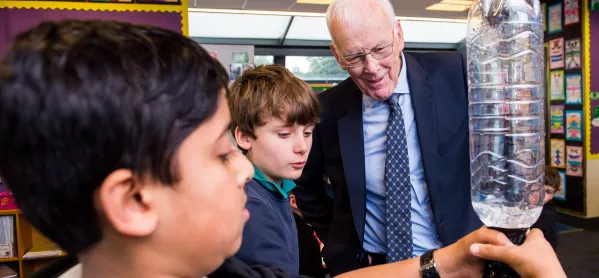- Home
- Primary science scheme hit by teacher shortage
Primary science scheme hit by teacher shortage

Two local authorities have dropped out of a Scottish government-backed programme designed to boost teacher confidence in the delivery of primary science, owing to teacher shortages.
The Raising Aspirations in Science Education (RAISE) programme - funded by the oil tycoon Sir Ian Wood (pictured) via the Wood Foundation, the Scottish government and councils - aims to boost primary teachers “skills, confidence and enthusiasm” delivering Stem (science, technology, engineering and maths) lessons. One key facet of the programme, which was set to run in 10 councils, is the appointment of a regional primary science development officer in each area to raise the profile of science in schools.
However, an interim report into the four-year pilot project has revealed that two authorities have been forced to drop out owing to the teacher shortage.
The current squeeze on school staff means the councils were unable to release a teacher to be seconded to the vital primary science development officer role, the report says.
Now, the number of authorities taking part in the pilot has reduced from 10 to eight.
The report says: “The primary reason for both withdrawals from the pilot was the difficulties associated with recruiting and releasing a seconded PSDO [primary science development officer] from their substantive school-based post. Although teacher shortages, particularly in Stem subjects, are recognised as a national issue, the extent of the issue varies between authorities.”
The Scottish government has introduced new teacher-education programmes in a bid to ease schools’ recruitment woes. However, unions argue that unless pay and workload are addressed, the government is “fiddling while Rome burns”.
The RAISE report - carried out by University of Glasgow’s Robert Owen Centre for Educational Change - also finds that English is one of the least popular subjects among primary pupils, with children saying that they enjoy ICT, PE and science the most.
The researchers surveyed more than 4,000 Scottish primary pupils and found that just 51 per cent of P2-4 pupils reported really liking language and literacy, falling to just 27 per cent when they hit P5-7, making it one of the least popular subjects in school along with RE.
Maths and numeracy proved considerably more popular, with 65 per cent of P2-4 children and 49 per cent of pupils in upper primary saying they liked the subject a lot.
The subjects primary pupils rated most highly were ICT, followed by PE and science.
When it comes to science, the report finds that the activities pupils most enjoy are doing experiments in class as well as going to a science museum or science centre, with 72 per cent of P2-4 children saying they really enjoyed doing experiments, as compared with 66 per cent of P5-7 pupils.
However, headteachers and teachers identified building teacher confidence as a challenge when it came to effective science education in primary, as well as “securing appropriate resources to teach practical science and finding ways to prioritise science alongside literacy, numeracy and health and wellbeing”.
The research also reveals that enjoying science in school does not necessarily mean the pupils want to be scientists in the future. In P5-7, almost half of pupils disagreed with the statement “I can see myself as being a scientist in the future”. A further 21 per cent said they did not know.
The report says: “There was a strong indication that, at this stage, many of the study pupils were keen to be involved with science when they left school, however little indication that they could see themselves as a scientist in the future which may coincide with the relatively low levels of those who know someone who works in science.”
In the future, the researchers plan to evaluate whether RAISE improves pupils’ attitudes to careers in science and to science as a subject - although they point out that “the ‘headroom’ for positive gains is limited” when it comes to the latter goal, because the subject is already one of the most popular in school.
Keep reading for just £1 per month
You've reached your limit of free articles this month. Subscribe for £1 per month for three months and get:
- Unlimited access to all Tes magazine content
- Exclusive subscriber-only stories
- Award-winning email newsletters



